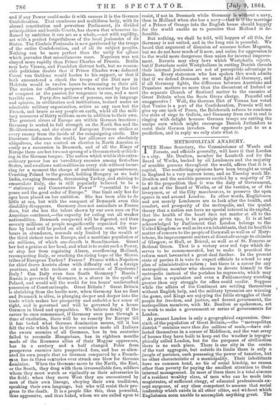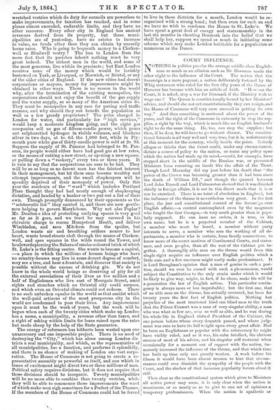METROPOLITAN ANARCHY.
TFIE Home Secretary, the Commissioner of Woods and Forests, and officials generally, will have it that London is a city. Mr. Doulton, member for Lambeth and for the Board of Works, backed by all Londoners and the majority of sensible persons throughout the world, affirm that it is a capital. The conflicting opinions have been brought as usual in England to a very narrow issue, and on Tuesday week Mr. Doulton and the sensible persons carried by a majority of 79 to 40 the proposition that it was the duty of Government, and not of the Board of Works, or of the vestries, or of the liverymen, or of the City macebearers, to preserve the open spaces in and around London. In other words Englishmen and not merely Londoners are to look after the health, and comfort, and prosperity of the metropolis, and the quaint theory that a nation can have no special interest in its capital, that the health of the heart does not matter at all to the fingers or the toes, is in principle given up. It is at last acknowledged by Parliament that London belongs to the United Kingdom as well as its own inhabitants, that its health is matter of concern to the people of Cornwall as well as of Mary- lebone, its improvements matters of directadvantage to citizens of Glasgow, or Hull, or Bristol, as well as of St. Pancras or Bethnal Green. That is a victory over red tape which de- serves to be commemorated, but to make it practical the reform must beecarried a great deal further. In the present state of parties it is vain to expect officials to attend to any plan of administrative reform ; but there is a career for any metropolitan member who chooses to devote himself to the metropolis instead of the parishes he represents, which may give him a reputation and even a Parliamentary standing greater than any struggle for office could confer. Suppose while the affairs of the Continent are settling themselves without English help, and the military tyrannies are winning the game, and Kings are enjoying the futile struggles of their people for freedom and justice, and decent government, the metropolitan members, with Mr. Doulton as spokesman, set to work to make a government or series of governments for London.
At present London is only a geographical expression. One- sixth of the population of Great Britain,—the "metropolitan district" contains more than five millions of souls,—have col- lected themselves in a corner of Middlesex, and the vast array of houses they have built to keep out the weather is topogra- phically called London, but for the purposes of civilization there is no such place. There is one city in the centre of the vast aggregate, but outside its limits there is only a jungle of parishes, each possessing the power of taxation but no other characteristic of a municipality. Their inhabitants have no common bond, no tie of social kinship, no reason other than poverty for paying the smallest attention to their internal management. In most of them there is a total absence of a resident wealthy class, of men who can be made into magistrates, of sufficient clergy, of educated professionals ex- cept surgeons, of any class competent to assume that social leadership which exists in all other cities, and without which Englishmen seem unable to accomplish anything great. The wretched vestries which do duty for councils are powerless to make improvements, for taxation has reached, and in some places almost exceeded, endurable limits, and they have no other resource. Every other city in England has ancient revenues derived from its property, but these muni- cipalities are of yesterday, have no estates to increase in value, no funds other than they can obtain by uneasily borne rates. Who is going to bequeath money to a Clerken-
well or Shadwell vestry The loss to London from the mere fact that its parishes inherit nothing must be very great indeed. The richest men in the world, and some of the most generous, live within its precincts ; but East London receives none of the money which would be lavishly bestowed on York, or Liverpool, or Norwich, or Bristol, or any of the older cities of England. If the new cities had decent corporations or mayors, money for improvements might be obtained in other ways. There is no reason in the world why, after the termination of the existing monopolies, the corporations should not enjoy the benefit of the gas supply and the water supply, as so many of the American cities do. They must be monopolies in any case for paving and traffic reasons, and why should they not benefit the population as well as a few greedy proprietors ? The price charged in London for water, and particularly for " high services," would keep a moderate kingdom going, and the eight gas companies sell us gas of fifteen-candle power, which pours out sulphuretted hydrogen in visible volumes, and blackens silver in two days, at 4s. 6d. the 1,000 feet, while in Ply- mouth pure white gas of thirty-candle power is sold at 2s. 9d. Suppose the supply of St. Pancras had belonged to St. Pan- cras, its people would either have had good gas at low rates, or the means.of cutting a new street, or opening a new square, or pulling down a "rookery," every two or three years. It is vain to say that the corporations are sure to be bad. They will be so as long as no decent man has the faintest interest in their management, but let them once become wealthy and attempt improvements, and the small shopkeepers will be speedily deprived of their monopoly of power. Only this year the residents of the "ward" which includes Portland Place thought they had had nearly enough of shopkeeping dictation, and headed by a banker or two put out a list of their own. Though promptly denounced by their opponents as the "aristocratic list" they carried it, and there are now gentle- men helping to govern Marylebone. Why not also Poplar? Mr. Doulton s idea of protecting outlying spaces is very good as far as it goes, and we trust he may succeed in his chivalric charge to rescue Hampstead Heath, and deliver Wimbledon, and save Mitcham from the spoiler, but London wants air and breathing orifices nearer to her heart, wants broad streets cleft through the mazes of Clerken- well, and open squares in the wilds round the Tower, and boulevardspiercing the Sahara of smoke-coloured brick of which St. Luke's is the fitting centre. She wants to become a capital, —a place in which the millions of human beings who have no country-houses may live in some decent degree of comfort, may see a tree, and hear a fountain, and discover that society is possible without the excuse of drinking gin. We do not know in the whole world beings so deserving of pity for all the external associations of their lives as the million and a half of Englishmen who live east of Moorgate Street, amid sights and stenches which no Oriental city could surpass, and which even an Oriental climate could not redeem. There is no such unbroken squalor in the world as that amidst which the well-paid artizans of the most prosperous city in the world are condemned to pass their lives. Any improvement upon it must be the work of years, but the work will be begun when each of the twenty cities which make up London has a name, a municipality, a revenue other than taxes, and a right of asking within limits for loans raised upon the rates but made cheap by the help of the State guarantee.
The energy of reformers has hitherto been wasted upon one unnecessary and one impossible project. There is no need of destroying the "City," which has alone among London dis. triets a real municipality, and which, as the representative of all municipalities, has a function, and performs it splendidly, and there is no chance of making of London one vast corpo- ration. The House of Commons is not going to create a re- presentative assembly as powerful as itself, and one which in times of excitement might direct two or three millions of men. Political safety requires divisions, but it does not require that. those divisions should be inorganic. Twenty municipalities will be no more able to combine than twenty vestries, while they will be able to commence those improvements the want of which make men sigh sometimes for a Prefect of the Thames. If the members of the House of Commons could but be forced
to live in these districts for a month, London would be re- organized with a strong hand ; but then even for such an end we have no wish to condemn the House to St. Luke's. We have spent a great deal of energy and statesmanship in the last six months in cheating Denmark into the belief that we shall help her, suppose we spend as much in initiating some scheme which may make London habitable for a population an numerous as the Danes.































 Previous page
Previous page